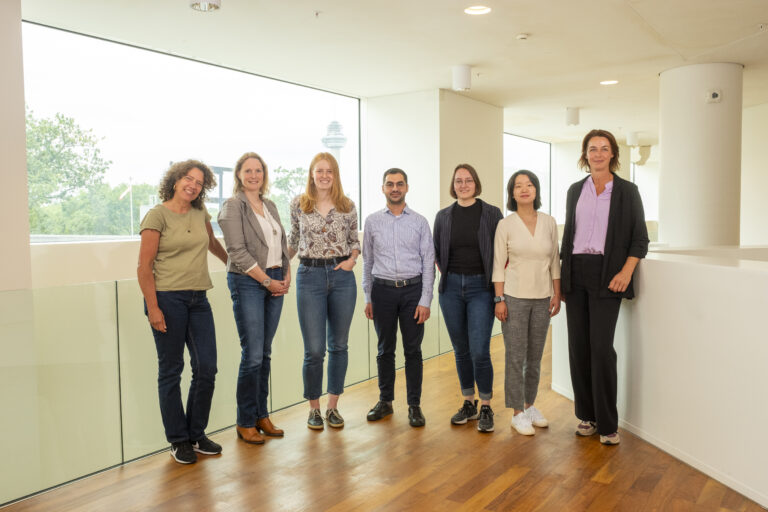Health Technology Assessment and Implementation
Evidence-based efficiency of curative and preventive care is important to simultaneously optimize health outcomes by improving treatment for patients, while keeping health care costs as low as possible. To achieve this, it is important to improve methods to measure outcome and to study the implementation and evaluation of interventions within health care.
Our work consists of a unique combination of health economic, epidemiologic and behavioral research, and of methodological development and implementation research. This multi-faceted approach allows us to contribute to evidence-based efficiency of curative and preventive care. The aim of our work is to simultaneously optimize health outcomes of patients by improving treatment, while keeping healthcare costs as low as possible. Two major pillars of our work are: a) improvement and application of methods to measure outcome (quality of life, burden of disease, costs and efficiency), and b) to study the implementation and evaluation of (prevention) interventions within healthcare. Therefore, our research consists of studies that explore methodological innovations within topics such as health-related quality of life, disability adjusted life years, disability weights, cost-utility analysis, social cost-benefit analysis, and implementation research. With its strong focus on methodology of outcome measurement, quantification of costs and disease burden and evaluation of interventions, our work is instrumental for the optimization of evidence-based care and prevention. Our primary area of application is the field of trauma and we collaborate with many clinical departments within Erasmus MC and national and international institutes. In addition, our work contributes to epidemiologic, economic and social research focusing on preventive interventions among vulnerable groups (e.g. elderly, obesity, low socioeconomic status) and translating this research into daily practice, thereby providing better care for our patients.
In 2007 the largest Q-fever outbreak ever worldwide occurred in the Netherlands, resulting in at least 4,000 known cases of acute Q-fever. There exists lack of knowledge on prolonged profound health and societal consequences, health care use and satisfaction with care. Therefore, we studied health symptoms, fatigue, health-related quality of life, social/work participation, health care use and satisfaction with care up to 10 years after infection in 500 Q-fever patients. Long-term health consequences are considerable for Q-fever patients. Fatigue (91%), concentration problems, physical exhaustion and joint pain were most prevalent health problems. Approximately 25% experienced difficulties with leisure time, household and social contacts. More than one third stopped working. The majority of the patients were unsatisfied with the quality of care they received. This study highlights the enormous impact of Q-fever on long-term health consequences and socioeconomic implications. The knowledge on current health care use and satisfaction with care may help improve healthcare, societal functioning and work status. The results of our study were presented to the minister of VWS and supported the decision to finance a Q-support 2.0 organisation structurally. Q-support will implement the recommendations of our study e.g. regarding education of health care providers on the long-term consequences to understand and support Q-fever patients adequately and refer them to specialised health care.
- CENTER-TBI: Examine the quality of life and recovery patterns after TBI and develop a set of disability weights by severity level.
- Euroqol Research Foundation: Generating solid research on methodology improvement regarding quality of life and burden of disease measurements.
- The burden of burn injuries: Health-related quality of life in the short and long term after burn injuries.
Polinder S, Cnossen MC, Real RGL, Covic A, Gorbunova A, Voormolen DC, Master CL, Haagsma JA, Diaz-Arrastia R, von Steinbuechel N. A Multidimensional Approach to Post-concussion Symptoms in Mild Traumatic Brain Injury. Frontiers in Neurology. 2018 Dec 9;9:1113. doi: 10.3389/fneur.2018.01113
Haagsma JA, James SL, Castle CD, et al. Burden of injury along the development spectrum: associations between the Socio-demographic Index and disability-adjusted life year estimates from the Global Burden of Disease Study 2017. Injury Prevention. 2020 Jan 8. doi: 10.1136/injuryprev-2019-043296
Geraerds AJLM, Haagsma JA, de Munter L, Kruithof N, de Jongh M, Polinder S. Medical and productivity costs after trauma. PLoS One. 2019 Dec 30;14(12):e0227131. doi: 10.1371/journal.pone.0227131
Spronk I, Polinder S, van Loey NEE, van der Vlies CH, Pijpe A, Haagsma JA, van Baar ME. Health related quality of life 5-7 years after minor and severe burn injuries: a multicentre cross-sectional study. Burns. 2019 Sep;45(6):1291-1299. doi: 10.1016/j.burns.2019.03.017
Olij BF, Erasmus V, Barmentloo LM, Burdorf A, Smilde D, Schoon Y, van der Velde N, Polinder S. Evaluation of Implementing a Home-Based Fall Prevention Program among Community-Dwelling Older Adults. Int J Environ Res Public Health. 2019 Mar 26;16(6). doi: 10.3390/ijerph16061079
de Munter L, Polinder S, van de Ree CLP, Kruithof N, Lansink KWW, Steyerberg EW, de Jongh MAC. Predicting health status in the first year after trauma. Br J Surg. 2019 May;106(6):701-710. doi: 10.1002/bjs.11132
